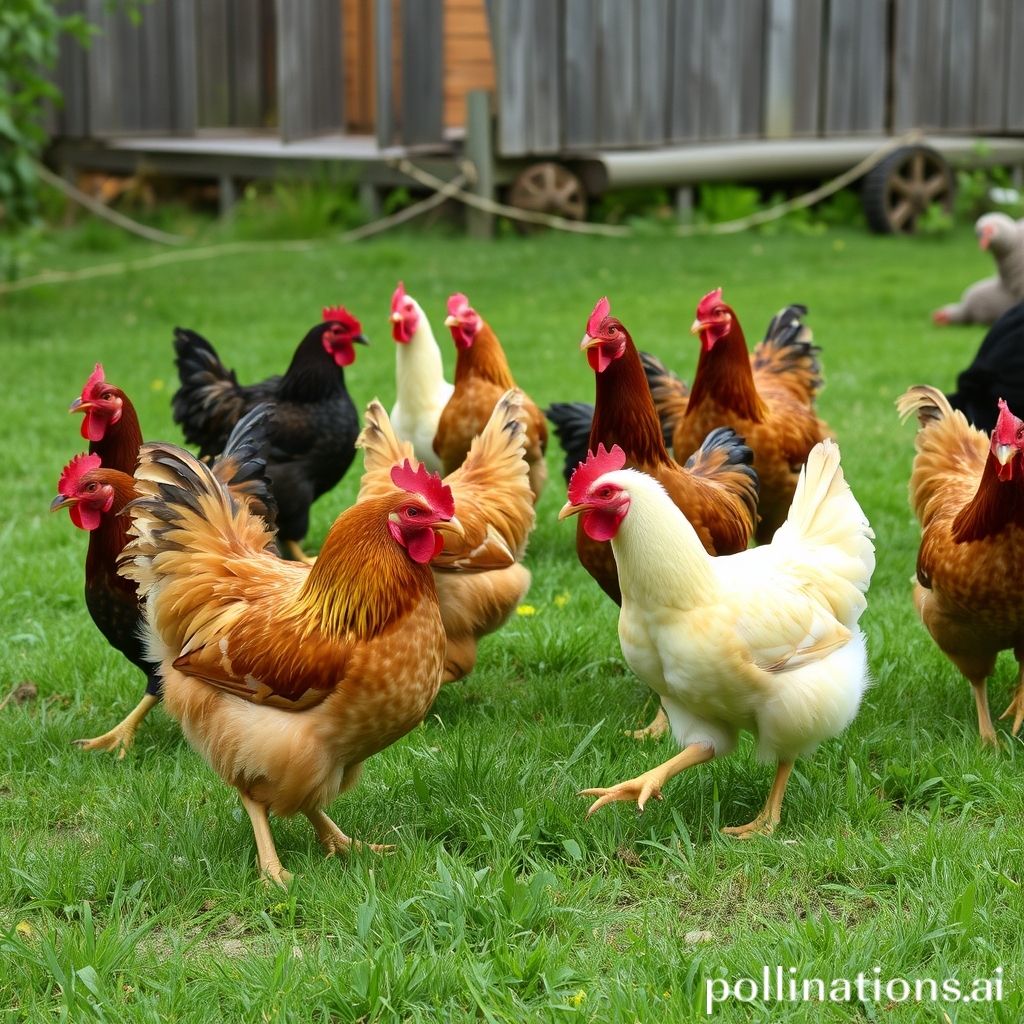As for the health and well-being of your chickens, knowing when to administer deworming medication is crucial. Worm infestations can negatively impact their overall health and egg production, so it’s important to stay informed about the best practices.
In this guide, we will provide you with the necessary information on when to worm chickens, including the signs to look out for and the recommended guidelines for effective treatment. By Perceiving the appropriate timing and frequency of worming, you can ensure the optimal health of your flock and prevent infestations from occurring. Let’s dive in and learn how to keep your chickens happy and healthy!
RentACoop Twin Cup Chicken Waterer and Feeder Set
Convenient Solution for Your Poultry
Indicators of Worm Infection in Chickens
Touching on the health of chickens, it is important to be aware of the signs of worm infestation. Worms can negatively impact a chicken’s overall well-being and productivity. By Cognizing these signs, chicken owners can promptly address the issue and safeguard their flock.
1. Changes in Appetite and Weight Loss
One unmistakable sign of a worm infestation in chickens is a noticeable change in appetite. Infected chickens may display a reduced appetite or a complete loss of interest in food. This can lead to weight loss, as worms compete with chickens for nutrients, causing malnourishment. Chicken owners should closely monitor their flock’s eating habits and take action if they observe any significant changes.
2. Droppings with Worms or Blood
Another clear indication of worm infestation in chickens is the presence of worms or blood in their droppings. Worms can cause internal damage to a chicken’s digestive system, resulting in the presence of worms in their feces. Moreover, the irritation caused by worms can lead to bleeding in the digestive tract, which may be visible in the droppings. Regularly inspecting the droppings for any unusual signs can help identify a worm infestation early on.
3. Poor Feather Condition and Decreased Egg Production
Worm infestations can also impact a chicken’s appearance and egg-laying abilities. Chickens affected by worms may exhibit a poor feather condition, with feathers appearing dull and unkempt. The presence of worms can interfere with nutrient absorption, resulting in inadequate feather growth. Furthermore, worm-infested chickens may experience a decline in egg production. Worms can disrupt the reproductive system, causing chickens to lay fewer eggs or produce eggs of compromised quality. Chicken owners should monitor both their flock’s feather condition and egg production to detect any potential worm infestations.

Best Practices for Deworming Chickens
Keeping your chickens healthy and free from worms is vital for their overall well-being. To effectively deworm your chickens, it is crucial to follow these recommended steps:
1. Embracing the Life Cycle of Worms
To effectively combat worms, it is important to have a basic Embracing of their life cycle. This knowledge will help you determine the appropriate timing for deworming. Worms typically lay eggs in the intestines of chickens, which are then passed out through their droppings. These eggs develop into larvae and can infect other chickens when ingested. By Embracing this cycle, you can identify the best time to administer deworming medication.
2. Choosing the Right Deworming Medication
There are various deworming medications available for chickens. It is crucial to choose the correct one based on the type of worms you are targeting. Common types of worms in chickens include roundworms, tapeworms, and cecal worms. Consult with a veterinarian to identify the specific worm species affecting your flock and select the appropriate medication accordingly.
3. Dosage and Administration Guidelines
Administering the correct dosage of deworming medication is crucial for its effectiveness. Follow the dosage guidelines provided by the manufacturer or as recommended by your veterinarian. It is important to administer the medication to each chicken individually, ensuring that they consume the proper amount. Avoid underdosing or overdosing, as both can be harmful to the chickens’ health.
Additionally, consider the withdrawal period, which is the recommended time to wait before consuming eggs or meat from dewormed chickens. This information is usually indicated on the medication packaging or provided by the veterinarian.
| Worm Type | Recommended Medication |
|---|---|
| Roundworms | Medication A |
| Tapeworms | Medication B |
| Cecal Worms | Medication C |
Timing of Deworming Chickens
Pertaining to the health of your chickens, timing is crucial when administering deworming medication. Here are some important considerations:
1. Age-Specific Deworming Recommendations
Chickens of different ages require specific deworming schedules to ensure optimal health and prevent infestations. Follow this guideline:
a) Chicks (0-8 weeks)
For newly hatched chicks, start deworming them at two weeks of age. Use a dewormer approved for young chicks and repeat the treatment every two weeks until they reach eight weeks of age.
b) Growing Chickens (8-16 weeks)
Once your chicks reach eight weeks of age, continue deworming them every four weeks until they reach 16 weeks. This helps protect them during their growth phase when they are more susceptible to parasites.
c) Adult Chickens (16+ weeks)
Adult chickens should be dewormed every three to four months to maintain their health and prevent infestations. If you notice any signs of parasitic infection, such as weight loss, diarrhea, or general lethargy, consult a veterinarian for immediate treatment.
2. Frequency of Deworming Based on Risk Factors
In addition to age, certain risk factors may influence the frequency of deworming your chickens. Consider the following factors:
a) Environmental Factors
If your chickens are kept in a high-risk environment, such as areas with poor sanitation or known parasite infestations, more frequent deworming may be necessary. Consult with a poultry health expert to assess the environmental risks and develop a suitable deworming schedule.
b) Flock Size
Larger flocks may have a higher risk of parasite transmission among chickens. Regularly monitor your flock for signs of infestation and adjust the deworming frequency accordingly. Quarantine new birds before introducing them to the flock to prevent introducing parasites.
c) Past Infestations
If your chickens have experienced previous infestations, it is advisable to deworm them more frequently to minimize the risk of reinfestation. Work with a veterinarian to develop a tailored deworming plan based on your specific situation.

Natural Methods to Eliminate Worms in Chickens
1. Using Herbs and Natural Supplements
A great way to naturally deworm chickens is Through inclusion herbs and natural supplements into their diet. These can boost their immune system and create an unfavorable environment for parasites within the chicken’s body.
Advantages of Herbs and Natural Supplements for Deworming Chickens:
- 1.1. Garlic: Garlic possesses natural antibacterial, antifungal, and antiparasitic properties that can effectively eradicate worms and other parasites in chickens.
- 1.2. Pumpkin Seeds: Pumpkin seeds contain an amino acid known as cucurbitacin, which paralyzes and eliminates intestinal worms in chickens.
- 1.3. Diatomaceous Earth: Diatomaceous earth is a natural substance that can be mixed with chicken feed to kill internal parasites by damaging their outer shells.
2. Maintaining Hygiene and Sanitation
Ensuring proper hygiene and sanitation practices in the chicken coop is crucial in preventing worm infestations. By implementing these practices, you can create an environment that is less hospitable for parasites to thrive, consequently reducing the need for frequent deworming.
Essential Hygiene and Sanitation Practices:
- 2.1. Regular Cleaning: Clean the chicken coop regularly to remove droppings, debris, and any potential sources of infection.
- 2.2. Proper Waste Disposal: Ensure proper disposal of chicken waste to prevent contamination and minimize the risk of parasites spreading.
- 2.3. Adequate Ventilation: Good airflow and ventilation in the coop can help reduce moisture levels and discourage the growth of parasites.
- 2.4. Preventive Measures: Quarantine new chickens before introducing them to the existing flock to prevent the introduction of parasites.
| Information |
|---|
| It is crucial to follow proper deworming practices for chickens to maintain their health and prevent infestations. Incorporating herbs and natural supplements, such as garlic, pumpkin seeds, and diatomaceous earth, can naturally eliminate worms in chickens. Additionally, maintaining proper hygiene and sanitation practices in the chicken coop, including regular cleaning, proper waste disposal, adequate ventilation, and preventive measures, is crucial to minimize the risk of infestations. By heeding these natural deworming methods and practices, chicken owners can effectively support the health and well-being of their chickens. |
Preventing worm infestations in chickens
1. Quarantine and biosecurity measures
Implementing quarantine and biosecurity measures is crucial in preventing worm infestations in chickens. By isolating new birds before introducing them to the existing flock, you can minimize the risk of introducing worms to healthy chickens. This practice also helps identify any potential signs of infestation and take necessary actions promptly.
Biosecurity measures involve maintaining a clean and hygienic environment for the chickens. Regularly clean and disinfect the coop, remove any feces or soiled bedding promptly, and provide adequate ventilation to prevent a buildup of moisture that can attract worms. Additionally, practicing good hygiene by washing hands thoroughly before and after handling the chickens can further minimize the risk of spreading worms.
2. Regular veterinary check-ups
Regular veterinary check-ups are crucial for monitoring the health of your chickens and detecting any signs of worm infestation. Consult with a veterinarian experienced in poultry care to establish a comprehensive deworming schedule tailored to your specific flock’s needs.
During the check-ups, the veterinarian will perform fecal examinations to determine if the chickens have worms. This diagnostic test helps identify the specific type of worms and their severity, allowing for targeted treatment. The veterinarian may also provide guidance on the appropriate deworming medication and dosage based on the chickens’ age, weight, and overall health.
Please note that prevention and treatment of worm infestations may vary depending on the specific circumstances. It is always recommended to consult with a veterinarian for personalized advice and guidance.
Conclusion
Knowing when to worm chickens is crucial for their overall health and well-being. Regularly deworming your chickens can help prevent various internal parasites and diseases, ensuring a thriving flock.
By closely monitoring their behavior, checking for signs of infestation, and consulting with a veterinarian, you can determine the appropriate timing for deworming. Remember to choose safe and effective deworming products and follow the recommended dosage for optimal results. Prioritizing the health of your chickens through proper deworming practices will lead to happier, healthier birds and a more successful poultry operation.
FAQ About Chicken Deworming
FAQ 1: How often should I deworm my chickens?
Chickens should be dewormed at least every three months to prevent the buildup of internal parasites.FAQ 2: Can I use natural remedies instead of deworming medication?
Meanwhile some natural remedies may have worm-repelling properties, they are generally not as effective as deworming medication. It is recommended to consult with a veterinarian for the most appropriate and effective treatment.FAQ 3: Is it safe to eat eggs from dewormed chickens?
Yes, it is safe to eat eggs from dewormed chickens. Deworming medication is designed to target internal parasites in the chicken’s digestive system and does not affect the quality or safety of the eggs.FAQ 4: Can I use the same deworming medication for all chicken breeds?
Yes, most deworming medications are suitable for all chicken breeds. Nevertheless, it is important to follow the dosage instructions provided by the manufacturer and consult with a veterinarian if you have any concerns.FAQ 5: What are the common types of worms in chickens?
The common types of worms in chickens include roundworms, tapeworms, cecal worms, and gapeworms. These parasites can cause various health issues in chickens if left untreated, so regular deworming is essential for their well-being. By embracing a deworming schedule and using appropriate medication, you can help maintain the health and vitality of your chickens. Remember to consult with a veterinarian for personalized advice and guidance regarding the specific needs of your flock.Read Similar Post:
1. Where Do Chickens Like To Be Petted?
2. How To Protect Chickens From Cats?

